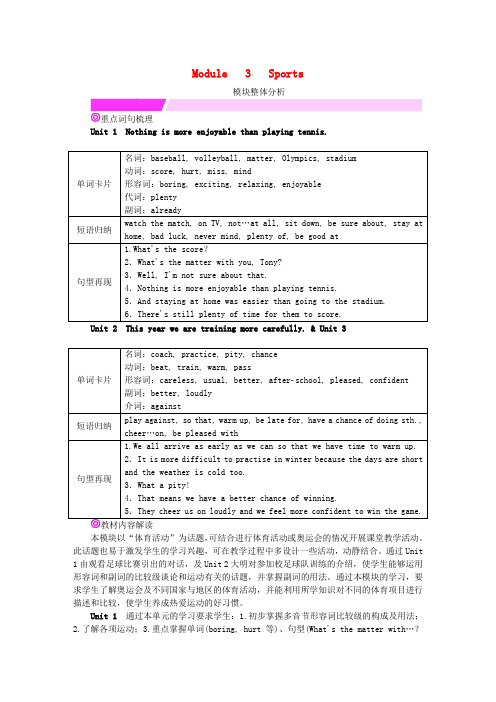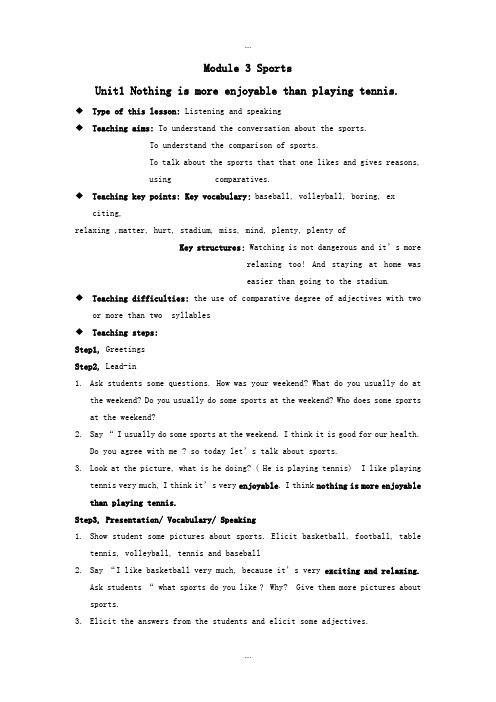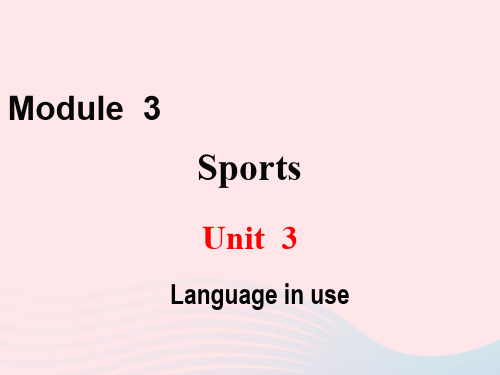2020外研版英语(新标准)八年级上册Module3SportsUnit3教案
外研版英语八年级上册Module 3《Sports》全单元教学设计

外研版英语八年级上册Module 3《Sports》全单元教学设计一. 教材分析《Sports》是外研版英语八年级上册Module 3的主题单元,主要介绍体育运动的相关知识。
本单元包括介绍运动项目的短文、运动器材的词汇、以及关于运动的句子。
教材内容丰富,贴近学生生活,有利于激发学生的学习兴趣。
二. 学情分析八年级的学生对体育运动有较高的兴趣,生活中也经常参与各种运动。
但部分学生在英语表达方面仍有困难,需要教师关注并提供个别辅导。
此外,学生们的团队合作意识和运动知识水平不同,需要在教学过程中加以考虑。
三. 教学目标1.知识目标:学生能掌握本单元的运动项目名称、运动器材词汇以及相关句子。
2.能力目标:学生能运用所学知识进行简单的英语交流,如谈论喜欢的运动、介绍运动项目等。
3.情感目标:培养学生积极参与运动的意识,提高团队合作精神。
四. 教学重难点1.重点:运动项目名称、运动器材词汇以及相关句子的掌握。
2.难点:运动项目名称和运动器材词汇的准确运用,以及句子结构的灵活运用。
五. 教学方法采用任务型教学法、情境教学法和分组合作教学法。
通过设定各种运动情境,引导学生进行英语交流,提高学生的实际运用能力。
同时,分组合作完成任务,培养学生的团队合作意识。
六. 教学准备1.准备运动项目的图片、视频等教学资源。
2.准备运动器材的实物或图片。
3.准备相关句子结构的模板。
七. 教学过程1.导入(5分钟)利用图片或视频展示各种运动项目,引导学生谈论自己喜欢的运动。
同时,询问学生对运动项目的了解,为新课的学习营造轻松的氛围。
2.呈现(10分钟)教师展示运动项目的图片,引导学生用英语说出运动项目的名称。
接着,呈现运动器材的实物或图片,让学生用英语表达。
在此过程中,教师给予鼓励和指导,帮助学生克服恐惧心理。
3.操练(10分钟)教师设立各种运动情境,如篮球比赛、足球比赛等,引导学生运用所学知识进行英语交流。
同时,鼓励学生大胆开口,提高口语表达能力。
初中英语外研版八年级上册Module3Sports

Module 3 Sports学生年级:八年级上册教学内容:外研版《英语》(新标准)8A Module 3 Sports一.教学内容分析:第三模块以学生熟悉且喜爱的体育运动为话题,结合该话题展开听,说,读,写活动。
对话与阅读文章都围绕学生喜爱观看和参加的运动类比赛展开。
学生在学校会参加各类体育运动,并且大部分学生都喜欢体育运动,因此,教师应充分了解学生的运动爱好,以该话题为契机,调动学生积极性,参与到课堂互动中来。
二.教学目的:(一)语言技能目标:1. 读:(1)能够读懂介绍活描写体育活动的短文(2)能够根据标题猜测文章大意(3)能够根据段落大意匹配段落和小标题(3)能够结合表格和问题找出文章细节信息2. 说:(1)能够根据表格提示转述课文(2)能够简单谈论自己喜爱的体育运动并做出训练的计划(二)学习策略:(1)本课在教学策略上采取自主学习策略和小组合作学习策略,鼓励学生学会自学和小组探究。
(2)在阅读上,本课通过对阅读课有效提问的探究,希望通过恰当的提问,帮助学生理解课文,完成阅读任务。
(三)情感态度:培养学生对体育活动的兴趣,并且通过话题的拓展,引导学生明白,要想赢得比赛,团队合作和艰苦训练是必不可少的。
(四)教学的重难点:通过有效问题的设计帮助学生理解文本,并能够转述文本。
三.学情分析1. 从话题上来说,体育运动这一话题贴近学生的兴趣爱好,学生对该话题背景信息了解较多,在课上有话可说,容易参与到课堂活动中。
教师可以利用该话题,调动英语学困生的兴趣。
2. 从阅读学习的角度,由于受到词汇量的限制,阅读一直是学生英语学习的难度。
本课结合对英语课堂上有效问题的探究这一专题,采用一系列的阅读策略,以有效问题引导学生完成对本篇阅读文章的理解。
四.教学步骤ⅠPre-readingStep 1. Lead-in 【操作方式】(1) 展示本班学生在上一届运动会中的照片,询问学生上届运动会的成绩。
Questions: 1. Are you in the pictures?2. Did we win in last year ’s sports meeting?创设情景询问,This year’s sports meeting is coming, do you want to do better, to be more successful? If we want to win the sports meeting this year, what should we do?继续追问学生,what else do we need to win the sports meeting this year?Do we need someone to help us? Do we need someone to cheer us up? And are there any difficulties for us?【设计意图】以运动会为话题导入本课课文,当学生看到自己和身边同学的照片时,会产生愉悦的学习心理,很容易进入本课的学习状态。
外研版八年级上册英语精品教学课件 Module 3 Unit 3

Unit 3 Language in use
1. To summarise and consolidate the use of comparative adjectives and adverbs.
2. To compare two places in your home town.
The more you go jogging, the healthier you will feel.
Jogging is cheaper than many sports.
1. This week’s match is already m__o_r_e_e_x_c_i_ti_n_g_ (exciting).
2. It is m__o_r_e_d_i_f_fi_c_u_lt_(difficult) to practise in winter.
3. We are training h_a_r_d_e_r_(hard) than usual. 4. This year we want to do _b_e_tt_e_r (good). 5. Nothing is m__o_r_e_e_n_j_o_y_a_b_l_e (enjoyable) than
5 -Who finally won?
- A student from
.
√a) Class 4
b) Class 5 c) Class 1
6 Read the passage and complete the sentences. A lot of people around the world enjoy jogging.
Volleyball is more exciting than tennis.
2020年秋八年级英语上册 Module 3 Sports整体分析 (新版)外研版

Module 3 Sports模块整体分析Unit 1Nothing is more enjoyable than playing tennis.本模块以“体育活动”为话题,可结合进行体育活动或奥运会的情况开展课堂教学活动。
此话题也易于激发学生的学习兴趣,可在教学过程中多设计一些活动,动静结合。
通过Unit 1由观看足球比赛引出的对话,及Unit 2大明对参加校足球队训练的介绍,使学生能够运用形容词和副词的比较级谈论和运动有关的话题,并掌握副词的用法。
通过本模块的学习,要求学生了解奥运会及不同国家与地区的体育活动,并能利用所学知识对不同的体育项目进行描述和比较,使学生养成热爱运动的好习惯。
Unit 1通过本单元的学习要求学生:1.初步掌握多音节形容词比较级的构成及用法;2.了解各项运动;3.重点掌握单词(boring, hurt等)、句型(What's the matter with…?等)及语法(多音节形容词的比较级)。
Unit 2通过本单元的学习要求学生:1.熟练掌握多音节形容词和副词比较级的使用;2.能读懂有关体育运动的文章;3.熟练运用词汇(careless, cheer…on等)、句型(…so that…等)及语法(多音节副词的比较级)。
Unit 3通过本单元的练习要求学生:1.进一步复习掌握形容词和副词的比较级及副词的基本用法,并能用这些语法项目来描述体育运动;2.能读懂有关体育运动的文章,培养对体育运动的兴趣。
1.Come and watch the football match on TV!2.—What's the score?—Spain scored a minute ago.3.What's the matter with you, Tony? You look tired.4.—And I hurt my knee. —That's too bad!5.Well, I'm not sure about that.6.—Oh, he missed!Oh, bad luck!—Never mind. There's still plenty of time for them to score.1.形容词的比较级(二)及副词。
外研版八上Module3《Sports》(Unit3)word教案

6.Baseball is more exciting than swimming.
Step3. Complete the sentences with the correct form of the words in brackets.
七级中学教案
学科:八年级英语第节主备人:邹敏授课人:20XX年月日
课题
Module3 unit3
Language in use
课型
New
教学
目标
1.学习使用形容词和副词的比较级。
2.在句子中能正确使用,熟练掌握比较级的用法。
重点
在句子中能正确使用,熟练掌握比较级的用法
难点
在句子中能正确使用,熟练掌握比较级的用法
Read through the examples with the students. Talk about the missing words in each.
Ask them to complete the sentences individually and then check answers in pairs.
Ask the students to read the passage and decide if the missing words are comparing two things or just describing
Something . Then complete the passage.
Ask the students to talk about the sports in pairs by asking and answering questions. Tell them to describe the sports with as many as words in the box as possible.
2020届外研版八年级英语上册:Module 3 单元教案设计

Module 3 SportsUnit1 Nothing is more enjoyable than playing tennis.◆Type of this lesson: Listening and speaking◆Teaching aims: To understand the conversation about the sports.To understand the comparison of sports.To talk about the sports that that one likes and gives reasons,using comparatives.◆Teaching key points: Key vocabulary:baseball, volleyball, boring, exciting,relaxing ,matter, hurt, stadium, miss, mind, plenty, plenty ofKey structures:Watching is not dangerous and it’s morerelaxing too! And staying at home waseasier than going to the stadium.◆Teaching difficulties: the use of comparative degree of adjectives with twoor more than two syllables◆Teaching steps:Step1, GreetingsStep2, Lead-in1.Ask students some questions. How was your weekend? What do you usually do atthe weekend? Do you usually do some sports at the weekend? Who does some sportsat the weekend?2.Say “I usually do some sports at the weekend. I think it is good for our health.Do you agree with me ? so today let’s talk about sports.3.Look at the picture, what is he doing? ( He is playing tennis) I like playingtennis very much, I think it’s very enjoyable. I think nothing is more enjoyablethan playing tennis.Step3, Presentation/ Vocabulary/ Speaking1.Show student some pictures about sports. Elicit basketball, football, tabletennis, volleyball, tennis and baseball2.Say “I like basketball very much, because it’s very exciting and relaxing.Ask students “ what sports do you like? Why? Give them more pictures aboutsports.3.Elicit the answers from the students and elicit some adjectives.4.Continue to say “I don’t like baseball, because it’s very boring anddifficult.” Ask students “How about you? Can you tell me what sports youdon’t like?”5.Elicit the answers from the students and elicit some adjectives and write themon the blackboard.6.Read the adjectives on the blackboard together.7.The teacher says “I not only like playing basketball, but also like swimming.But I think swimming is more relaxing than playing basketball.”8.Ask students to make sentences like the example.9.Students say their sentences one by one.10.Work in pairs and ask and answer.Step4, Listening1, Read the words in the box in Activity 1 chorally.2, Match the word with the pictures.3. Say “Just now we talked about our favourite sports , Daming and Betty also likesports very much. Let’s listen to the tape and find out what sports they like. Whenyou are listen, you should number the words as you hear them..4. Play the recording and listen for the first time.5. Listen again and ask the students to check their answers.6. Elicit the answers from the students.7. Listen and check the answer together.Step5, Listening and reading1.Ask students to read and listen to Activity 3. And answer the questions.2.Ask a student “ What do you do and say when you meet your teacher?”and writeit on the blackboard.3.Write the answer on the blackboard.4.Do Activity5. Work in pairs and. Talk about what so you do and say when you meetdifferent people.5.Elicit the answers from students.Step6, Listening and reading1.Students work in pairs and read the conversation by themselves.2.Listen to the tape.3.Answer the teacher’s questions:What do Russian/ Chinese/ Americans/ India/ Maori people do when they meet?4.Work in pairs and find out the answers from the conversation.5.Elicit the answers from students.6.Listen to the tape and read the conversation.7.Read the conversation in roles.plete the table with the correct form of the words from the box.Step7, Pronunciation and speakingHomework: Copy the new words and try to remember them.Recite the conversation.Reflection:Unit2 This year we are training more careful.◆Type of this lesson: Reading and writing◆Teaching aims: To skim the text on sports and understand its main idea To be able to describe sports and games, using the comparative forms of adjectives.To make comparison with given information◆Teaching key points: Key vocabulary:beat, careless, coach, fan club, against, practice, warm, warm up, usual, better, pass,, p ity, loudly, train Key structures:We all arrive as early as we can sothat weave time to warm up.It’s more difficult to practice in winter.It gets dark earlier.This year we are training more carefully.That means we have a better chance of winning.◆Teaching difficulties: To be able to use imperative sentences◆Teaching steps:Step1, GreetingsStep2, RevisionRevise the sports we talked about in last class.Step3, Lead-in1.Show students two pictures on page 20, ask them what sport it is andwhat people are doing in the picture.2.Students have discussion about the picturesStep4, Vocabulary/ Presentation1.Students say something about the pictures.e the pictures to elicit the new words. Beat, cheer…on, coach, fan club, playagainst, train, pleased, pity, loudly, confident.3.Read and repeat the new words chorally.Step5, Reading1.Tell students to look at the title of the passage by Daming and ask them whatthe passage is about. Ask them to guess what sport he is training for.2.Elicit the ideas from the class.3.Write some general pre-reading questions on the board for the students to focuson while they are reading.Why is Daming going to school on Saturday?How does the team practice this year?Why is it good to have fans around?4.Read the passage, students check their guesses and answer the questions.5.Elicit answers to the questions from the class.6.Listen and read the passage.plete the table after the passage. Read the passage again, underline the keyinformation and complete the table.Step5 Exercises1.Activity32.Activity4Step6 WritingHomework: 1. Copy the new words and try to remember them2. Finish Activity5 and 6 on Page21.Reflection:Unit3 Language in use◆Type of this lesson: Revision and application◆Teaching aims: To summarise and consolidate the use of comparativesTo practise using adverbs after verbs and distinguish adverbsfrom adjectives.◆Teaching steps:Step1. Preparation/ Language PracticeGo through the sentences in the practice box with the students.Read the sentences togetherStep2. Activity1Step3. Activity2Step4. Activity3Step5. Activity4Step6. Activity5Step7. Activity6。
外研版八年级英语上册M3 Sports全单元教案

模块授课教案课题Module 3 Sports 模块序号 3教学目标1.知识目标:1> 掌握词汇:baseball, volleyball, boring,exciting, relaxing…2> 掌握句型:It’s more difficult topractice in winter. This year we’re passing more carefully. 以及一些口语表达句式。
3>掌握形容词副词的比较级的规则变化及不规则变化。
2.能力目标:1> 能听懂并谈论关于体育运动的英文表达。
2> 能熟练地运用形容词副词的比较级进行比较,谈论与差异对比有关的话题。
3> 能够读懂与体育运动有关的文章,并能就其内容展开讨论。
3.情感目标:1> 通过教学使学生知道体育运动的重要性,培养学生对体育锻炼的热爱。
2> 使学生了解体育竞技的精神和意义所在。
教材及学生分析在上一模块的教学中学生已经对形容词的比较级的基本规则有了初步的了解,但对于一些较长的单词及副词并没有涉及。
本模块延续了这一教学内容,将比较级的知识进行更系统和完整的学习。
消除学生心中存在的一些疑惑从而更加透彻的掌握这一知识点。
本模块的话题是体育运动,这也是与学生的日常生活息息相关的内容,因此,教师可以将学习和生活联系起来,从而加强理解和记忆。
重点与难点1.教学重点: 掌握第三模块的新单词和新句型。
形容词和副词的比较级。
2.教学难点:形容词和副词的比较级的特殊变化。
课时分配第一课时:Unit1 第二课时:Unit2第三课时:Unit3 第四课时:Module test 第五课时:Comment课时教学设计课题Unit 1 Nothing is moreexciting than playingtennis.主备课人授课时间2014年09 月课型Listening and speaking教学目标1.知识与能力:1> 掌握词汇:baseball, volleyball, boring,exciting, relaxing…2> 掌握句型:It’s more di fficult to practicein winter. This year we’re passing more carefully. 以及一些口语表达句式。
八年级英语上册Module3SportsUnit3Languageinuse教学课件(新版)外研版

Presentation
复习形容词比较级的规则变化
单音节 和部分 双音节 形容词
一般在词尾加-er
tall→taller
long→longer
以不发音的e结尾,在 fine→finer
词尾加-r
late→later
以辅音+元音+辅音字 big→bigger 母结尾的重读闭音节, thin→thinner 双写尾字母再加-er
I’m really tired after last night’s tennis match. 昨晚的网球赛后我真的很累。
The teacher speaks very slowly and carefully. 这位老师讲得很慢、很仔细。
注意副词与形容词在位置及功能上的不同, 试比较:
1) The teacher speaks _c_a_r_e_fu__ll_y_. 这位老师讲得很仔细。
Practice
1. — Sorry, I can’t follow you. Would you please speak ______?
— All right. A. more slowly B. more loudly C. more quickly D. more quietly
2. This place is not big enough for Lucy’s birthday party. We should find a _____ one.
2) The teacher is __ca_r_e_f_u_l__. 这位老师很细心。 副词 修饰动词时通常出现在行为动词 (实义动词)之后。 形容词 通常位于系动词之后或名词之前。
形容词变副词 1.直接 + ly,如:
- 1、下载文档前请自行甄别文档内容的完整性,平台不提供额外的编辑、内容补充、找答案等附加服务。
- 2、"仅部分预览"的文档,不可在线预览部分如存在完整性等问题,可反馈申请退款(可完整预览的文档不适用该条件!)。
- 3、如文档侵犯您的权益,请联系客服反馈,我们会尽快为您处理(人工客服工作时间:9:00-18:30)。
Unit 3 Language in useⅠTeaching modelRevision and applicationⅡTeaching methodFormal and interactive practiceⅢTeaching aims1. Function: Describing and comparing sports.2. Structure: Comparative adjectives(more); adverbs and comparative adverbs(-er, more); irregular comparatives.3. Around the world: The marathon race4. Task: Making a sports poster.ⅣTeaching aidsTape recorder , OHP , handoutsⅤTeaching StepsStep 1 RevisionTalk about the pictures.Step 2 Work in pairs.1. Ask the students to use the words in the box in Activity 1.boring cheap difficult easy exciting expensive popular relaxing2. Ask the students to look at the pictures in Activity 1 carefully.3. Talk about the sports.4. Read through the example with the class.—What’s your favourite sport?—My favourite sports is swimming. It is exciting.5. Work in pairs.6. Now compare the sports.1) Table tennis is more exciting than tennis.2) Tennis is ⋯3) Basketball is ⋯4) Football is ⋯5) Swimming is ⋯6) Baseball is ⋯Step 3 Language practice1. Read through the example sentences in the box with the whole class.2. Ask the students to repeat the sentences in the box.Step 4 Grammar2)形容词的比较级(上一模块我们学习了单音节形容词和部分双音节形容词的比较级构成形式们和比较级句子的表达方式。
那么,还有部分双音节和多音节形容词,它的比较级是如何构成的呢?也是在词尾加-er 吗?不是的,一般在形容词前加 more 构成比较级。
例如:1) Football is _________________ than baseball in most countries.在很多国家,足球比棒球更受流行。
2) Nothing is _________________ than playing tennis.没有什么比打网球更令人愉快的了。
3) It ’s ________________to practise in winter (than in summer ).。
大冬季训练(要比夏季训练)难度更Keys: 1) more popular 2) more enjoyable 3) more difficult副词和副词的比较级说,副般来英语中的副词该如何使用呢?应该放在句中的什么地方呢?一。
例如:词主要用来修饰动词、形容词、副词或其他结构1) She plays the piano _________.她钢琴弹得很糟。
2) I ’m ____________ tired after last night ’s tennis match.昨晚网球赛后我真的很累。
2) We all arrived as _________ as we could.我们都尽早赶到了。
3) The teacher speaks very _________ and ___________.。
这位老师讲得很慢、很仔细:注意副词与形容词在位置及功能上的不同,试比较1) The teacher speaks _____________.。
这位老师讲得很仔细2) The teacher is ___________.。
这位老师很细心Keys: 1) badly 2) really 3) slowly; carefully1) carefully 2) careful实义动词)后,而不难发现,副词一般修饰动词,通常出现在行为动词(形式上形容词一般跟在系动词后作表语。
另外,形容词和副词也可以进行的转换,如:careful + ly → carefully quick + ly →quicklysafe + ly s→a fely busy + ly → busilyheavy + ly → heavily,累但需要注意,部分词语既可做形容词也可做副词,学习过程中要注意积如fast, early, late 等。
副词的比较级则变化和不规副词比较级别和形容词比较级的变化形式大致相同,也分规则变化两种,例如:1) We are training __________ because we want to win.。
我们训练的更刻苦,因为我们想要获胜2) This year we are training ________________.今年我们训练得更认真了。
3) Sam did ___________ this year than last year.萨姆今年表现得比去年好。
Keys: 1) harder 2) more carefully 3) better“the+ 比较级, the + 比较级”是比较级表达中的一个固定句式,表示“越⋯⋯,越⋯⋯”。
例如:The more carefully you drive, the safer it is. 开车越小心越好。
常用形容词、副词比较级不规则变化如下:原级级比较good / well betterbad / ill, badly worsemany / much morelittle lessfar farther / furtherStep 5 Exercises:Complete the sentences.1. Ask the students to read through the sentences in Activity2.1) We trained ____________ (hard) this year than last year.2) The team played ______________ (well) on Saturday than on Tuesday.3) They practised ______________ (carefully) this year at the club than in the park.4) Playing football is ____________ (exciting) than watching it.5) Playing tennis is _________________ (expensive) than swimming.2. Complete the sentence with the correct form of the words in brackets.3. Ask the students to check with a partner.4. Check the answers:Keys:1, harder 2. better 3. more careful 4. more exciting 5. more expensive Complete the sentences.1. Ask the students to read through the example with the class.Tom did his homework carelessly (careless).The music is loud (loud).2. Ask the students to read through the sentences in Activity3.1) They are working ____________ (hard) to learn English.2) This bike was ___________ (cheap), so we decided to buy it.3) The teacher speaks __________ (slow) and __________(careful).4) Mary is going to get up _________ (early) because she needs to catch the first bus.5) Running is very __________ (easy). You can do it anywhere.6) I do not like to be ___________ (late)7) I am afraid our team is doing very ___________ (bad)3. Complete the sentences with the correct forms of the words in brackets.4. Ask the students to check with a partner.5. Check the answers:Keys: 1. hard 2. cheap 3. slowly, carefully 4. early 5. easy 6. late 7. badlyComplete the passage.1. Ask the students to read through the passage in Activity 4.I wanted to choose a sport to keep fit. First I tried swimming. I joined the swimming club, but the lessons were (1) ___________ ( expensive ) than I thought. So I stopped swimming and tried running. The running club is (2) ___________ (popular) than the swimming club. We ran (3) ___________(slowly) in the park. Soon, I felt that running was (4) ___________ (boring)! I decided to try something (5) ___________ (exciting). I went walking in the mountains. Once we got lost in the mountains, and I hurt my leg (6)___________ (badly). It is a bit (7) ___________ (dangerous) to walk in the mountains, but I like the sport all the same.2. Complete the passage with the correct form of the words in brackets.3. Ask the students to check with a partner.4. Check the answers:Keys: 1. more expensive 2. more popular 3. slowly 4. boring 5. exciting6. badly7. dangerousStep 6 Listening practice.1. Ask the students to read through the questions in Activity 5 individually.1 What was the race?a) Boys ’800 metresb. ) Girls ’800 metres.c) Girls ’400 metres.2 How many classes take part in the race?a) One b) Four c) Eight3 Who ran faster than the others at first?a) Joy b) Sandy c) Everyone4 What happens to Sandy later on?a) She stops b) She runs slowly c) She cries5 --- Who finally won?--- A student from ____.a) Class 4 b) Class 5 c) Class 12. Play the tape.3 Listen and choose the correct answer.4. Ask the students to check with a partner.5. Check the answers:Step 7 Read the passage and complete the sentences.1. Ask the students to read the passage.2. Complete the sentences.1) Jogging means ___________.2) Walking is ____________ than jogging.3) To start jogging, you only need some _______________________________.4) Jogging in the countryside is ______________ than jogging in the city.5) From the passage we know the more you go jogging, ____________ you willfeel.3. Ask the students to check with a partner.4. Check the answers:Keys:1. running slowly2. slower3. comfortable sports clothes and good runningshoes4. quieter and more fun5. the healthierStep 8 Around the world: The marathon race1. Ask the students to look at the picture and discuss what they can see.2. Read through the information with the whole class.3. Talk something about “The marathon race ”.4. Complete the sentences.1) The marathon race gets its name from a _______ over 2,500 years ago.2) The battle happened at a place called_________.3) A soldier ran over _________ kilometers to tell people the good news.4) Today ’s marathon race is an __________ and __________ Olympic sport.5) __________ people race in many different marathons every year.5. Ask the students to check with a partner.6. Check the answers:Keys: 1. battle 2. Marathon 3. forty 4. important , popular 5. Thousands of7. Read the passage together.Step 9 Exercises中考链接( ) 1. —Sorry, I can ’t follow you. Would you please speak ______?—All right. (2012 辽宁丹东)A. more slowlyB. more loudlyC. more quicklyD. morequietly( ) 2. This place is not big enough for Lucy ’s birthday party. We shoulda _____ one. (2012陕西)A. bigB. smallC. biggerD. smaller( ) 3 —For me, winter is the best season of a year!—Me too. _____ if there ’re some snows. I like a white world浙. (2江012)金华A Better B. Worse C Longer D. Shorter( ) 4. _____ children there are in a family, _____ their life will be. (2011 济南)A. The less, the betterB. The fewer, the betterC. Fewer, richerD. More, poorer( ) 5. Dear students, please read every sentence carefully. The more ______ you are, the _____ mistakes you ’ll make.湖(2南01邵1 阳)A. carefully, fewerB. careful; lessC. careful; fewer( ) 6. —What do you think of Liu Huan?—Oh, he is my favorite singer. I think no one can sing ______. (2011威海)A. goodB. wellC. better D best( ) 7. Jack is good at drawing. I think no one draws ________. (2011安徽)A. betterB. bestC. worseD. worst( ) 8. Mum, this T-shirt is much too small for me. Would you buy me a______ one? (2011江西)A. niceB. largeC. nicerD. largerKeys: 1. A 2. C 3. A 4. B 5. C 6. C 7. A 8. DStep 10 Module task: Making a sports poster2020-2021年最新it.A: What ’s your favourite Olympic sport?B: My favourite Olympic sport is ⋯A: Why do you like it?B: I like it because ⋯2. Make a poster. Find a photo for your favourite sport and include it in theposter.Our favourite Olympic sportOur favourite Olympic sport is swimming / table tennis/ ⋯We like it because it is exciting, popular ⋯It is more exciting than3. Show your poster to your classmates.11。
